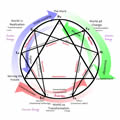Reasoning about Reasoning
2015-01-05
The Wikipedia page on Reason and Reasoning has some interesting things to say:
Reason is the capacity for consciously making sense of things, applying logic, establishing and verifying facts, and changing or justifying practices, institutions, and beliefs based on new or existing information.[1] It is closely associated with such characteristically human activities as philosophy, science, language, mathematics, and art, and is normally considered[by whom?] to be a definitive characteristic of human nature.[2] The concept of reason is sometimes referred to as rationality and sometimes as discursive reason, in opposition to intuitive reason.[3]
Reason or "reasoning" is associated with thinking, cognition, and intellect. Reason, like habit or intuition, is one of the ways by which thinking comes from one idea to a related idea. For example, it is the means by which rational beings understand themselves to think about cause and effect, truth and falsehood, and what is good or bad. It is also closely identified with the ability to self-consciously change beliefs, attitudes, traditions, and institutions, and therefore with the capacity for freedom and self-determination.[4]
So reason and reasoning is a piece of cake. All we have to be or do is:
- Be conscious
- Be logical
- Establish and verify facts
- Recognize the connections between cause and effect
- Separate truth from falsehood
- Determine what is good or bad for us
and last but not least, have...
"the ability to self-consciously change beliefs, attitudes, traditions and institutions"
...giving us the "capacity for freedom and self-detgermination."
Taken as a whole, all of this may seem overwhelming. However, if we look at it piece by piece, can we say that there is something here that we absolutely cannot do? Probably not, because If we apply reasoning to reasoning itself we quickly come to the realization that reasoning actually is possible, even for us mere mortals.
- John Hutcherson's blog
- Log in to post comments
